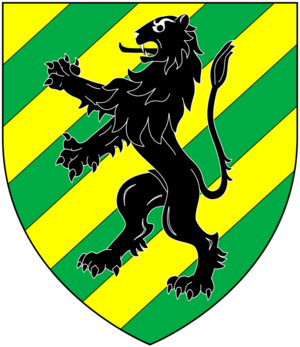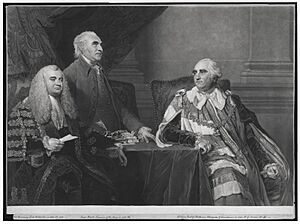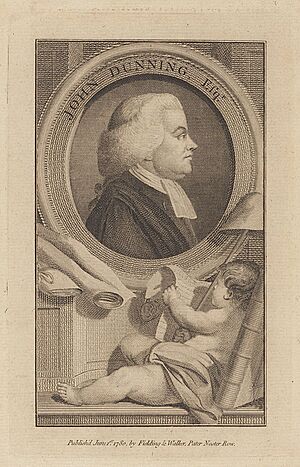John Dunning, 1st Baron Ashburton facts for kids
Quick facts for kids
The Lord Ashburton
|
|
|---|---|
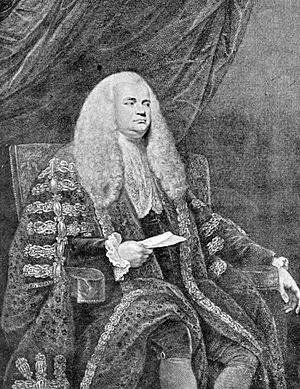
John Dunning (later 1st Baron Ashburton), detail from an engraving of a 1782 group portrait by Sir Joshua Reynolds
|
|
| Chancellor of the Duchy of Lancaster | |
| In office 1782–1783 |
|
| Preceded by | The Earl of Clarendon |
| Succeeded by | The Earl of Derby |
| Solicitor General for England and Wales | |
| In office 1768–1770 |
|
| Preceded by | Edward Willes |
| Succeeded by | Edward Thurlow |
| Personal details | |
| Born | 18 October 1731 |
| Died | 18 August 1783 (aged 51) |
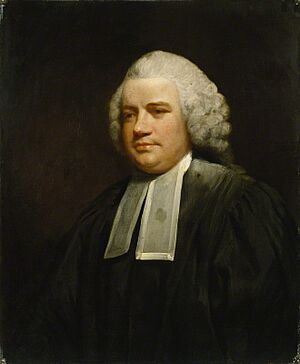
John Dunning, 1st Baron Ashburton (born October 18, 1731 – died August 18, 1783) was an important English lawyer and politician. He was born in Ashburton, a town in Devon, England. He became famous for defending the British East India Company in 1762. He served as a Member of Parliament starting in 1768.
One of his most famous moments was in 1780. He made a strong statement in the House of Commons. He said that "the influence of the crown has increased, is increasing, and ought to be diminished." This meant he believed the King's power was growing too much and needed to be reduced. In 1782, he was given the title of Baron Ashburton.
Contents
Early Life and Education
John Dunning was born in Ashburton, Devon, on October 18, 1731. His father, also named John Dunning, was a lawyer in Ashburton. His mother was Agnes Judsham.
John went to Ashburton Grammar School. After school, he trained with his father in law. Later, he moved to London to study to become a barrister. He joined the Middle Temple, a famous legal society, on May 8, 1752.
Becoming a Lawyer
While studying, Dunning became friends with other future legal figures. He officially became a barrister on July 2, 1756. For a few years, he didn't have much success.
However, in 1762, a leading lawyer named John Glynn fell ill. Glynn gave his cases to Dunning. This was a big chance for Dunning. By 1764, he was earning a lot of money. He also wrote a pamphlet defending the English East India Company. In 1765, he became well-known for arguing against the legality of "general warrants." These were broad search warrants that many people thought were unfair.
In 1766, Dunning was appointed as a judge in Bristol. On January 28, 1768, he became the Solicitor-General. This was a very important legal role in the government.
A Voice in Parliament
In March 1768, Dunning was elected to Parliament. He represented the area of Calne. Even though he was Solicitor-General, he often spoke out against the government's policies.
In January 1770, he resigned from his role as Solicitor-General. He continued to speak against the government. He believed in protecting people's rights. For example, he argued against the right of Parliament to imprison a city official.
Dunning also opposed the government's actions towards the American colonies. In May 1774, he spoke against a bill that would change the government of Massachusetts Bay. This bill was one of the causes of the American Revolution. He continued to support motions to review laws that upset the American colonists.
In May 1778, Dunning supported a bill to help Roman Catholics. He also helped get a monument built in Westminster Abbey for the Earl of Chatham, a respected statesman.
His most famous moment in Parliament came on April 6, 1780. He proposed his famous resolution: "the influence of the crown has increased, is increasing, and ought to be diminished." This meant he wanted to reduce the King's power. Despite opposition, this resolution was passed by Parliament.
In September 1780, Dunning was re-elected for Calne. He continued to be an important voice. In February 1782, he supported ending the American war. Soon after, a new government was formed.
On March 27, 1782, Dunning joined the Privy Council. This is a group of advisors to the King. On April 8, he was given the title of Baron Ashburton. He became the chancellor of the Duchy of Lancaster on April 17. He continued to advise the government on legal matters.
Later Life and Legacy
John Dunning married Elizabeth Baring on March 31, 1780. Elizabeth was the daughter of a successful merchant named Johann Baring. Her brothers later founded the famous Barings Bank.
John and Elizabeth had two sons:
- John Dunning (born 1781), who sadly died before his father in 1783.
- Richard Dunning, 2nd Baron Ashburton (born 1782), who inherited his father's title. Richard died in 1823 without children, so the title of Baron Ashburton ended. However, the title was later given again to his cousin, Alexander Baring.
Dunning's health began to fail. He died on August 18, 1783, at the age of 51. He was buried in the church in Ashburton, his hometown. A monument was built there to remember him.
John Dunning is remembered as a brilliant lawyer and a strong voice for reducing the power of the Crown in British politics.
Images for kids
-
John Dunning (later 1st Baron Ashburton), detail from an engraving of a 1782 group portrait by Sir Joshua Reynolds
 | Delilah Pierce |
 | Gordon Parks |
 | Augusta Savage |
 | Charles Ethan Porter |


